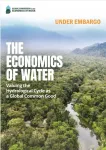New research has revealed that the connection between per- and polyfluoroalkyl substances, or PFAS, and kidney damage may be tied to dysregulation of the gut microbiome, which is made up of bacteria and other microorganisms that live in the digestive tract.
PFAS are manufactured chemicals used in a wide range of products, including everything from furniture to food packaging. They are often called “forever chemicals” because once they accumulate in the environment or the human body, they take a very long time to break down.
The group of chemicals is known to increase risk for a range of health problems, including cardiovascular disease, cancer and chronic kidney disease, but the biological mechanisms behind that risk are poorly understood.
“Nearly everyone has PFAS in their blood, and these chemicals are associated with a number of negative health effects. But we don’t have any known interventions to reduce PFAS in the body, so we can’t actually provide recommendations to help,” said Hailey Hampson, PhD, a postdoctoral fellow in population and public health sciences at the Keck School of Medicine of USC, who is lead author of the new study.
Findings from the research, funded in part by the National Institutes of Health, are starting to connect the dots between that problem and potential solutions. Building on past studies that link kidney damage to both PFAS and gut problems, the research team analyzed the three factors together for the first time.
They found that increased PFAS exposure was associated with worse kidney function four years later, and that changes in the gut microbiome and related metabolites explained up to 50% of that decrease in function. The results were just published in the journal Science of the Total Environment.
The findings, which add to other Keck School of Medicine studies of PFAS, including longitudinal research, offer early clues about how to protect the kidneys from PFAS-related damage.
“Our findings are an important piece of the puzzle about the many different health risks of PFAS, which can provide policymakers with information that helps them develop policies to protect the public from exposure to these chemicals,” said Jesse A. Goodrich, PhD, an assistant professor of population and public health sciences at the Keck School of Medicine and senior author of the study.
Declining kidney function
The researchers analyzed data from 78 participants, ages 17 to 22, enrolled in the Southern California Children’s Health Study, a large-scale longitudinal effort to understand the effects of pollution on health. Fifty-six percent of the sample was Hispanic, a group that faces an outsized risk for chronic kidney disease.
At baseline, the researchers collected blood and stool samples that allowed them to measure PFAS exposure, gut microbiome bacteria and circulating metabolites (these metabolites, many of which are produced by the gut microbiome, are present in the blood). At a follow-up appointment four years later, the researchers collected a second round of data on kidney function.
They found that when PFAS exposure increased by one standard deviation, kidney function was 2.4% worse at the follow-up visit. The researchers then performed a statistical analysis to determine whether a third factor—gut bacteria and related metabolites—contributed to that association.
The analysis revealed two separate groups of bacteria and metabolites that helped explain the effect of PFAS exposure on kidney function. One group explained 38% of the change in kidney function, and one group explained 50% of the change. Both groups of bacteria and metabolites performed beneficial activities, such as lowering inflammation in the body, that were hindered when PFAS exposure went up.
“We saw that exposure to PFAS was potentially altering the composition of the microbiome, associated with lower levels of beneficial bacteria and lower anti-inflammatory metabolites,” Hampson said.
A roadmap for future work
The findings provide a roadmap for researchers seeking to better understand the link between PFAS and kidney health. Hampson and her colleagues observed reductions in anti-inflammatory metabolites, as well as the bacteria that produce them, and increases in inflammatory metabolites.
“This points to inflammation and oxidative stress as a potential mechanism, so that’s an area where future research can focus,” she said.
One limitation of the study is its small sample size. Larger studies are needed to determine whether and how the findings can be used to protect against PFAS-induced kidney damage, Goodrich said.
Next, the research team will move beyond measuring metabolites in the blood to detecting their presence in specific body tissues, including in the kidneys.
About this research
In addition to Hampson and Goodrich, the study’s other authors are Shiwen Li, Hongxu Wang, Qiran Jia, Sarah Rock, Elizabeth Costello, Frank D. Gilliland, Zhanghua Chen, Max Aung, Leda Chatzi and David V. Conti from the Department of Population and Public Health Sciences, Keck School of Medicine of USC, University of Southern California; Jonathan Nelson from the Department of Medicine, Keck School of Medicine of USC, University of Southern California; Douglas I. Walker from the Rollins School of Public Health, Emory University, Atlanta, Georgia; Petter Bjornstad from the and Laura Pyle from the University of Colorado School of Medicine, Aurora, Colorado; and Tanya L. Alderete from the Johns Hopkins Bloomberg School of Public Health, Baltimore, Maryland.
This work was supported by the National Institute of Environmental Health Sciences [K01ES036193, R01ES035035, R01ES029944, P01ES022845, 5P30ES007048, P01ES011627, T32ES013678, P30ES007048]; the Environmental Protection Agency [RD83544101]; the Hastings Foundation; and the National Institute of Diabetes and Digestive and Kidney Diseases [R01DK140831
END



